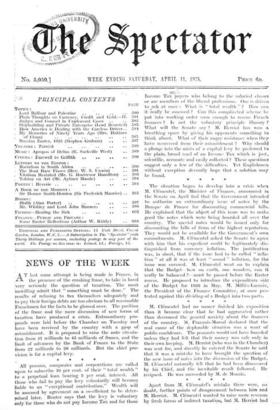The situation began to develop into a crisis when N.
Clemente], the Minister of Finance, announced in the Senate on April 2nd that the Government intended to authorize an extraordinary issue of notes by the Banque de France for discounting commercial bills. He explained that the object of this issue was to make; good the notes which were being hoarded all over the country. The special notes would be issued only for discounting the bills of firms of the highest reputation: They would not be available for the Government's own commitments. M. Clementel asked the Senate to agree with him that his expedient could be legitimately dis.: tinguished from currency inflation. The justification was, in short, that if the issue had to be called " infla, tion " at all it was at least " sound " inflation, for the issue was covered. M. Clementel went on to explain that the Budget—hew on earth, one wonders, can it really be balanced ?--must be passed before the Easter recess. He proposed to introduce the expenditure side of the Budget for 1926 in May. M. Millies-Lacroix, the President of the Finance Committee, at once pro- tested against this dividing of a Budget into two parts. _










































